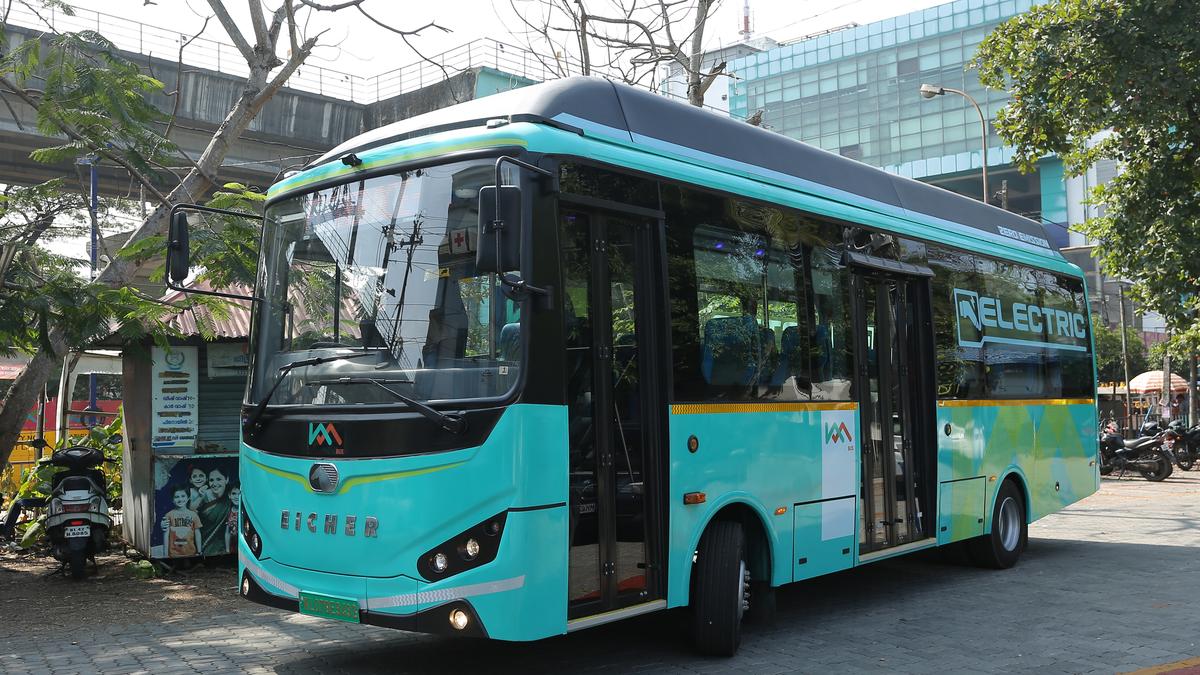
Kochi’s ‘Metro Connect’ feeder e-buses to be launched in a week
The Hindu
Kochi Metro's Metro Connect fleet offers electric, air-conditioned buses for seamless travel to key city destinations.
Metro Connect, a fleet of 15 electric, air-conditioned feeder buses of the Kochi metro, will start ferrying commuters from metro stations to the international airport, adjacent commercial hubs, and areas without adequate public transport, from next week.
The launch comes after successful trial runs of the turquoise blue buses on various routes. Equipped with air suspension and 33 seats, these buses offer smooth acceleration, zero air and noise pollution, and a more comfortable experience compared to diesel-powered buses. Media personnel who toured the city on one of these buses reported a pleasant travel experience.
Fare structure
Kochi Metro Rail Limited (KMRL) has fixed ₹20 as the fare for travel up to five km in the regular AC feeder buses, while it will be ₹80 to travel in the lengthier Aluva-international airport corridor in similar buses that have relatively bigger seats. The fare can be paid digitally and by cash.
Routes
Four buses will operate on the Aluva-airport route, running every 20 minutes during peak hours and every 30 minutes during off-peak hours, from 6:45 a.m. to 11 p.m. These buses will not have intermediate stops. Additional routes include: Kalamassery-Government Medical College Hospital route (every 30 minutes from 8.30 a.m. to 7.30 p.m.); High Court-MG Road circular route (every 10 minutes from 8.30 a.m. to 7.30 p.m.); Kadavanthra-KP Vallon Road-Panampilly Nagar circular route (every 25 minutes from 9 a.m. to 7 p.m.); and the Kakkanad Water Metro terminal-Infopark/KINFRA Park/ Collectorate routes (every 25 minutes from 8 a.m. to 7 p.m.), said Loknath Behera, MD, KMRL. “These buses will provide first and last-mile connectivity from metro stations,” he added.
The electric buses will be recharged overnight at Muttom and will undergo ‘opportunity charging’ (recharging at short intervals) at Aluva, Kaloor, and Vyttila after covering distances of 150–160 km. Unlike diesel buses, they do not require permits to operate on various routes, said Gokul T.G., additional general manager (Urban Transport), KMRL.

“A small evergreen tree native to South America, it is reported to have been introduced to our parts in the 16th century. It “adoption” could have been the result of the ornamental value it brought to a landscape: it puts out striking bluish purple flowers that attract butterflies and has bright yellow-orange fruits. In Tamil, it is called seemai vairamaram,” says T.D. Babu, a member of the Chennai District Green Committee and a key member of tree conservation organisation Nizhal. Babu underlines its special features — “considered densest and water-proof, this tree’s has been used in ship building. Its resin and bark are said to have medicinal properties. These factors led to its commercial exploitation and dwindling numbers.” In light of the threat of extinction faced by this tree, one would expect more care to be given to the clutch of Roughbark lignum-vitae trees found in Chennai. One of them has the Queen Mary’s College Campus for an address. Babu notes that the base of the tree has suffered damage, not natural but human-inflicted in the past. It also displays “wounds” further up its gnarled frame — an amputated branch. Babu wants the state of the tree’s precincts to reflect its preciousness. Currently, the earth it stands in is overrun with weeds.





















 Run 3 Space | Play Space Running Game
Run 3 Space | Play Space Running Game Traffic Jam 3D | Online Racing Game
Traffic Jam 3D | Online Racing Game Duck Hunt | Play Old Classic Game
Duck Hunt | Play Old Classic Game










